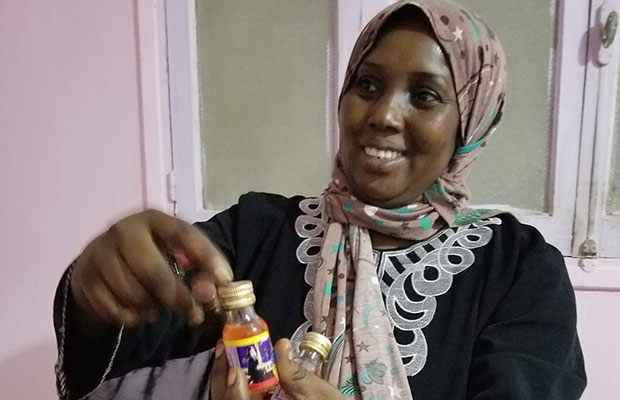
Brighter Futures are Dawning in Egypt
Education and skills training are a set of golden keys that can unlock the chains of poverty. Unfortunately, far too many youth in Egypt lack access to its power—a situation further complicated by global migration. Thanks to our generous donors, thousands of participants have learned transformational employment and entrepreneurial skills through a long-term, Salesian-led vocational training program in Cairo.
“Egypt is both a destination and a transit country for refugees and asylum seekers,” explains Father Gus Baek, director of Salesian Missions. “Many have fled wars and conflict in places like Ethiopia, Yemen, Sudan, South Sudan and Eritrea, and arrive seeking safety and shelter before moving on. But Egypt’s labor laws can make it difficult for outsiders to find work . . . which means that most of them end up living in Cairo’s slums with no way to improve their situations.” In fact, according to official statistics, more than 271,100 people from over 60 countries had registered to live in Egypt as of December 2021.
Rania is one of them. Today, through the Salesian-run “Sunrise Project for Urban Refugees and Vulnerable Hosts,” she operates a successful home-based business in Cairo—and earns enough money to support herself and her four children, the youngest of whom is two years old.
Like so many other refugees from Sudan, Rania sought relief from the war that killed her husband and left her a widow. But the poverty she faced in a foreign land, combined with the many challenges of resettling her family, quickly overshadowed the gains she’d made in physical safety.
Rania’s situation wasn’t unique. That’s why, in 2014, Salesian Missions first began working with a Salesian-run technical vocational school in Cairo on the Sunrise Project. Through scholarships offered by the program, refugees and vulnerable Egyptians have new opportunities to gain marketable skills, find employment and support themselves and their families. In addition to vocational education, enrollees learn valuable life and job readiness skills to help them successfully adjust to their new urban environments. As part of one of the Sunrise Project’s early cohorts, Rania and her fellow graduates were invited to participate in a comprehensive grant training program for seed funds. These graduates then submitted entrepreneurial projects to the Sunrise team who selected the strongest micro-enterprise proposals. During Rania’s year, the team chose to fund approximately 40 projects, including hers.
Today, Rania offers henna, hairstyling, makeup, and dress and shoe rentals for weddings. She also sells perfumes, skincare products and hand-made crafts. Often, she will bring her skills on the road—traveling to weddings where she sells her henna designs to entire families and their friends. Girls from the nearby school in her neighborhood also purchase her goods and services.
Much like Rania, Kedr had few employment options available to him when he first arrived in Cairo from Somalia. He worked hard as a housekeeper, but couldn’t earn enough money to support himself. Cultural and language barriers also prevented him from finding a better-paying job. When he heard about the Sunrise Project, he leapt at the opportunity to learn a new vocation. With the help of scholarships, this eager young man enrolled in the mechanics course and thrived.
“I didn’t know anything about mechanics, but now I am like a doctor to the car,” he recently exclaimed. After finishing his course, Kedr worked as an intern and now has a permanent job and a fixed salary in the same auto shop. His income has increased by more than 50 percent, which means he no longer has to take out loans or depend on his friends to cover his basic expenses.
The additional social services that participants in the Sunrise Project receive—such as transportation allowances, grocery vouchers and medical checkups—have proven integral to their success.
“When their basic needs are met, people like Rania and Kedr are better able to focus on their learning and performance,” Fr. Gus continues, “so that they ultimately can meet those needs for themselves.”
The Sunrise Project also provides entrepreneurship and financial literacy workshops, job panels and other training to help refugees build the skills they need to succeed in the workplace. This year, it began connecting students and graduates with local businesses to help build brand awareness and create new sales channels for their products. So far, two Sudanese small business proprietors have successfully partnered with a crafts gallery and artisanal market to sell their handmade goods. And, the project covered table rental fees at three different bazaars where 15 female entrepreneurs displayed and sold their products and services, as well as networked with future customers and partners.
Since its inception eight years ago, the Sunrise Project has already improved the lives and livelihoods of more than 3,000 vulnerable people. And it’s immensely popular among refugees; more than 2,000 applicants recently vied for the limited number of trainee openings. More than 500 of those who were accepted and completed baseline assessments, received technical and vocational training. This led to 426 successful graduates from September 2020 to September 2021. In addition, 65 trainees received a seed grant and one-on-one mentoring, and 16 micro-entrepreneurs and past alumni received small business development grants.
Our mission plants the seeds for success. What’s your mission?
Learn more about our work in Egypt.

